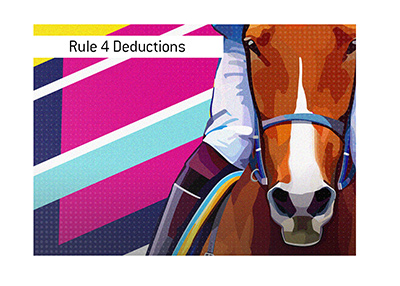Rule 4" Deductions Are In Place So Sportsbooks Don't Get Killed If a Horse is Pulled From a Race
Published on January 20th, 2020 12:47 am ESTWritten By: Dave Manuel
 You make a bet on a horse that you received a tip on - a horse that is 6/1 to win.
You make a bet on a horse that you received a tip on - a horse that is 6/1 to win. Your horse is participating in a race where there is an absolute stud in the field - a stud that has won five straight races and is 1/4 to win.
Essentially, you are practically throwing your money away by betting on the horse that you received a tip on.
But wait - the favoured horse is forced to pull out of the race due to a leg injury. Suddenly, your horse is favoured to win. What great luck! Your bet at 6/1 is looking golden now - you are already counting your money.
Unfortunately, sportsbooks have something called "Rule 4 Deductions" that come up in situations such as this one. Otherwise, sportsbooks would stand to get absolutely killed if favoured horses pulled out of a race.
But wait - shouldn't the sportsbook honour your bet? After all, you made the wager in good faith and had no clue that the favoured horse would pull out of the race.
Unfortunately, sportsbooks make the rules, and you agree to abide by their rules when you sign up to their sites. For this reason, "Rule 4 Deductions" will always apply if a horse pulls out of a race.
-
Here is how "Rule 4 deductions" work in a nutshell - the better the horse that pulls out of a race, the bigger chunk of winnings you will lose out on.
For instance, if a horse is 1/10 to win (a massive favourite) and pulls out, the sportsbook will claw back 90% of your winnings IF your horse ends up winning the race.
So that £100 pound wager on a 5/1 horse that you placed a bet on? You'd have to give back 90% of your winnings.
Here is a table that will show you how much you'd have to give back in earnings depending on the odds of the horse that pulled out of the race:
1/9 or less, 1.11 or less, 90%
2/17 to 2/11, 1.12 to 1.18, 85%
1/5 to 1/4, 1.2 to 1.25, 80%
2/7 to 3/10, 1.29 to 1.30, 75%
1/3 to 2/5, 1.33 to 1.40, 70%
4/9 to 8/15, 1.45 to 1.53, 65%
4/7 to 8/13, 1.57 to 1.62, 60%
4/6 to 4/5, 1.66 to 1.80, 55%
5/6 to 20/21, 1.83 to 1.95, 50%
Even to 6/5, 2.00 to 2.20, 45%
5/4 to 6/4, 2.25 to 2.50, 40%
8/5 to 7/4, 2.60 to 2.75, 35%
9/5 to 9/4, 2.80 to 3.25, 30%
12/5 to 3/1, 3.40 to 4.00, 25%
16/5 to 4/1, 4.20 to 5.00, 20%
9/2 to 11/2, 5.50 to 6.50, 15%
6/1 to 9/1, 7.00 to 10.00, 10%
10/1 to 14/1, 11.00 to 15.00, 5%
Over 14/1, Over 15.00, No Deduction
So, if a really good horse pulls out, you'd be looking at a very small win instead of a potentially massive one. If a horse that wasn't expected to win pulls out, you would forfeit zero or close to zero of your winnings.
From the sportsbook's perspective, if a really strong horse pulls out of a race, the odds for the remaining horses in the race will fundamentally change, so they shouldn't be on the hook for unforeseen circumstances. This is why Rule 4 applies.




